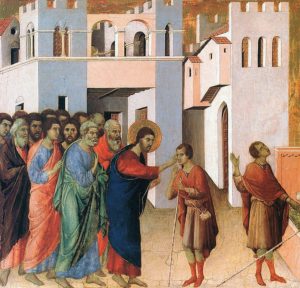Thoughts on Sunday’s Lessons for Oct. 28, 2018

Jesus opens the eyes of a man born blind (1308-1311). Painting by Duccio di Buoninsegna (1255-1319). The National Gallery, London. (Click image to enlarge.)
First Reading (Track One): Job 42:1-6, 10-17
The cosmic conversation between God and Job comes to its happy conclusion. Earlier we have heard Job angrily wondering why God would not respond to him; then saw Job stand awestruck as God speaks from a whirlwind about the magnificence of God’s creation, next to which which Job is tiny and insignificant. Now, in the last chapter of the book, Job responds. He quietly, faithfully accepts God’s power. Having seen and heard God, he can only despise himself, repenting in dust and ashes. But then the world turns: God restores Job’s fortunes, double what they had been before. Job lives a long life with riches, a big family and the respect of his friends. So Job’s story ends happily, but remember, too, that even when things don’t get better, God is God and loves us still.
First Reading (Track Two): Jeremiah 31:7-9
When God is with us, when God saves us, when God makes us well and showers grace upon us, we can hardly help but express our gratitude and joy with shouts of thanksgiving and praise. Hold this theme of gratitude and grace in our thoughts as we reflect on today’s readings. First, after having heard last week the Prophet Isaiah’s meditation on Israel’s Suffering Servant carrying the pain of exile, we now turn to the Prophet Jeremiah, speaking to Israel in exile with loving words of comfort and joy: God will bring the remnant of Israel out of exile. The weak and the strong, mothers and children, those who can’t see and those who can’t walk, all will return home together, weeping with joy, praising God, and giving thanks.
Psalm (Track One): Psalm 34:1-8
A good thematic fit with today’s readings, this portion of Psalm 34 meshes nicely with the story of Job. Titled “Praise for Deliverance from Trouble” in the New Revised Standard Version, it begins with a song of praise, singing our intention to bless and praise God at all times. When King David, imagined as the author of this Psalm, found himself in a dangerous place, he prayed for deliverance from his terror. God indeed saved him from all his troubles, and he responded with joy: “Taste and see that God is good; happy are they who trust in the Most High!”
Psalm (Track Two): Psalm 126
The pain of exile and the joy of return form the base narrative for much of the Old Testament’s Psalms and Prophets. Sunday’s Psalm clearly echoes Jeremiah’s happy prophecy in these verses of joy. We sing in celebration of Israel’s restoration on Mount Zion – Jerusalem, the home of the Temple. Turning to a striking agricultural image of planting fields and reaping a harvest bounty, we sing in memory of our ancestors sowing with tears, reaping with songs of joy; going out weeping, carrying the seed, but bringing home ripe sheaves of grain, joyfully shouting our thanksgiving.
Second Reading: Hebrews 7:23-28
Seeking to bring Jewish converts back to the infant church, the author of Hebrews compares Judaism unfavorably to Christianity in words that sound less than generous to modern ears. These verses, building on those that went before, declare that Jesus is a far greater high priest than the old high priests of the Temple. The Jewish high priests were mere mortal, sinful humans, who had to purify themselves repeatedly through constant sacrifices because they were weak. Perhaps it’s best simply to stand with this reading’s conclusion: Jesus, who is made perfect forever, stands for us all through his sacrifice on the cross.
Gospel: Mark 10:46-52
Like other disabled people in Jesus’ time, a blind person had little option but beg for basic sustenance, and their neighbors often assumed that their disability was punishment for some grievous sin. Sadly, physical blindness has also been an enduring metaphor for willful refusal to “see” or believe. So Bartimaeus’ neighbors had little but pity, at best, for Bartimaeus as he sat by the Jericho road. Perhaps a few people might throw him a small coin when he begged for alms. So when Bartimaeus heard Jesus passing by, he yelled as loud as he could, asking Jesus to have mercy on him. Jesus listened, Jesus healed him, declaring that his faith had made him well; and Bartimaeus, his sight restored, chose to follow Jesus. How might we answer if Jesus asked us, as he asked the blind man, “What do you want me to do for you?”
What are “Track 1” and “Track 2”?
During the long green season after Pentecost, there are two tracks (or strands) each week for Old Testament readings. Within each track, there is a Psalm chosen to accompany the particular lesson.
The Revised Common Lectionary allows us to make use of either of these tracks, but once a track has been selected, it should be followed through to the end of the Pentecost season, rather than jumping back and forth between the two strands.
For more information from LectionaryPage.net, click here.
